Horses are majestic animals that have been loyal companions to humans for centuries. Whether you’re a seasoned equestrian or a first-time horse owner, understanding how long horses live and how to care for them throughout their life is crucial for ensuring their health and happiness.
So, how long do horses live? The answer depends on a variety of factors, such as their breed, genetics, diet, and overall care. On average, horses live between 25 to 30 years, but with proper attention and care, some can live well into their 40s or beyond.
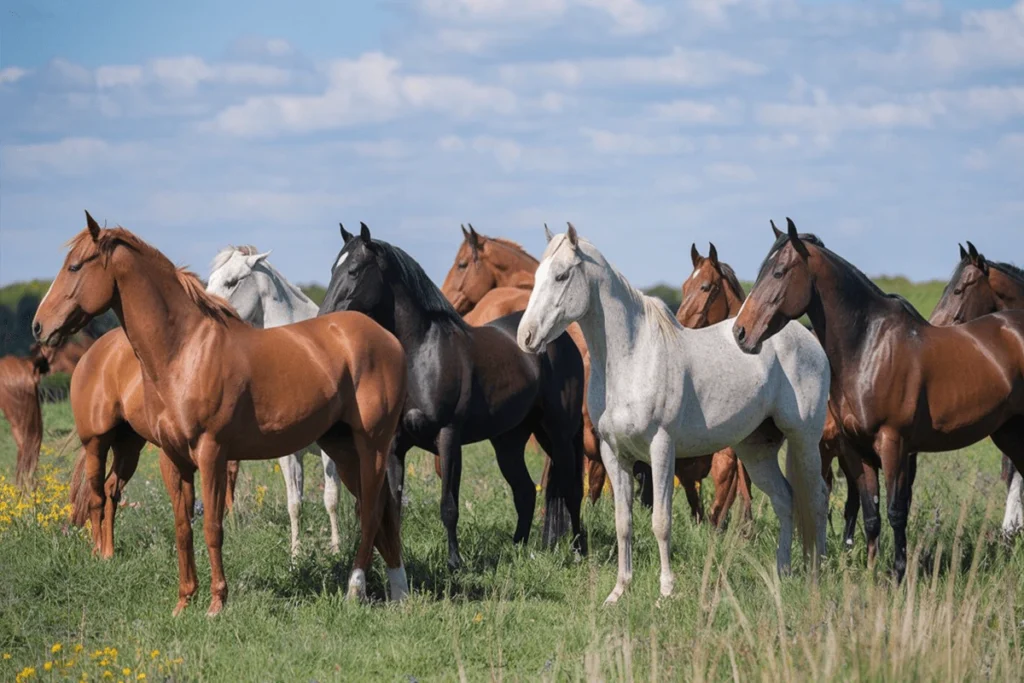
In this ultimate guide, we’ll explore everything you need to know about horse lifespans, from factors that affect their longevity to tips for maintaining their health at every stage of life. We’ll also debunk common myths about horse care and provide actionable insights to help you give your horse the best life possible. Let’s dive in!
Understanding the Average Horse Lifespan
What is the Average Lifespan of a Horse?
how long do horses live Actually? Well, Horses typically live an average of 25 to 30 years. However, this range can vary significantly depending on factors such as breed, genetics, and care. Some horses, especially those with optimal living conditions, may live well into their 40s. Ponies, for instance, often outlive larger horse breeds due to their robust genetics and lower susceptibility to certain health issues. While this range provides a general guideline, every horse is unique, and their lifespan depends on how well their needs are met throughout their life.
Key Lifespan Factors: Genetics, Diet, and Exercise
A horse’s lifespan hinges on several critical factors:
- Genetics:
Genetics play a foundational role in determining how long a horse might live. Some breeds have a predisposition for longevity, while others may be prone to specific health conditions that could shorten their lives. Horses with strong bloodlines often inherit good health, while those with hereditary issues may require more attentive care. - Diet:
A horse’s diet directly impacts its lifespan. Providing a balanced diet rich in essential nutrients, such as fiber, vitamins, and minerals, is crucial. Poor nutrition can lead to health issues like colic, laminitis, or weakened immunity, all of which can shorten a horse’s life. Owners must adjust feeding plans based on the horse’s age, activity level, and specific needs. - Exercise:
Regular exercise is vital for maintaining a horse’s physical and mental well-being. Horses that are allowed to roam, graze, and engage in physical activity tend to live longer, healthier lives. However, overtraining or lack of movement can lead to joint issues, obesity, or other health concerns. A balanced routine ensures the horse remains active without strain.
Differences in Lifespan by Horse Breeds
Different horse breeds have varying lifespans, influenced by their genetic makeup and intended uses:
- Thoroughbreds: These horses, bred for racing, often have shorter lifespans, averaging around 25 years. The physical demands of racing can take a toll on their bodies, leading to earlier health issues.
- Arabians: Known for their endurance and strong genetics, Arabians often live longer than many other breeds, with some reaching 30 to 35 years or more.
- Shetland Ponies: Ponies, including Shetland Ponies, are renowned for their longevity. They can often live well into their 40s with proper care.
- Draft Breeds: Larger draft breeds like Clydesdales or Shires typically have shorter lifespans, often around 20 to 25 years, due to their size and susceptibility to joint and heart issues.
Understanding these differences helps owners tailor care to their horse’s specific needs, ensuring the best quality of life possible.
The Longest-Living Horses in History
While most horses live between 25 and 30 years, some exceptional horses have defied expectations, living far beyond the average lifespan:
- Old Billy: This horse holds the record for the longest-lived horse, reaching an astounding age of 62. Born in the 18th century, Old Billy was a barge horse, known for his remarkable resilience.
- Sugar Puff: A pony from England, Sugar Puff lived to the impressive age of 56. His longevity highlighted the importance of attentive care and a healthy lifestyle.
- Shayne: Shayne, a liver chestnut gelding in the UK, lived to the age of 51. He spent his final years grazing peacefully on a farm, showcasing the impact of a stress-free environment.
These examples illustrate that, with proper care, horses can enjoy long and fulfilling lives, often exceeding expectations.
Factors That Affect Horse Longevity
Genetics and Their Role in Horse Lifespan
Genetics shape a horse’s potential lifespan and overall health. Some horse breeds naturally enjoy longer lives due to their genetic makeup. For example, ponies and Arabians tend to live longer than larger breeds like Thoroughbreds or draft horses. This difference arises from their resistance to certain health issues and the stress levels associated with their use.
Selective breeding also plays a significant role. Horses bred for racing or other high-performance activities, such as Thoroughbreds, may inherit traits that prioritize speed and agility over long-term health and longevity. Conversely, horses bred for endurance, like Arabians, often carry genes associated with robust health and stamina. Recognizing the genetic predispositions of your horse allows you to anticipate potential health challenges and tailor their care accordingly.
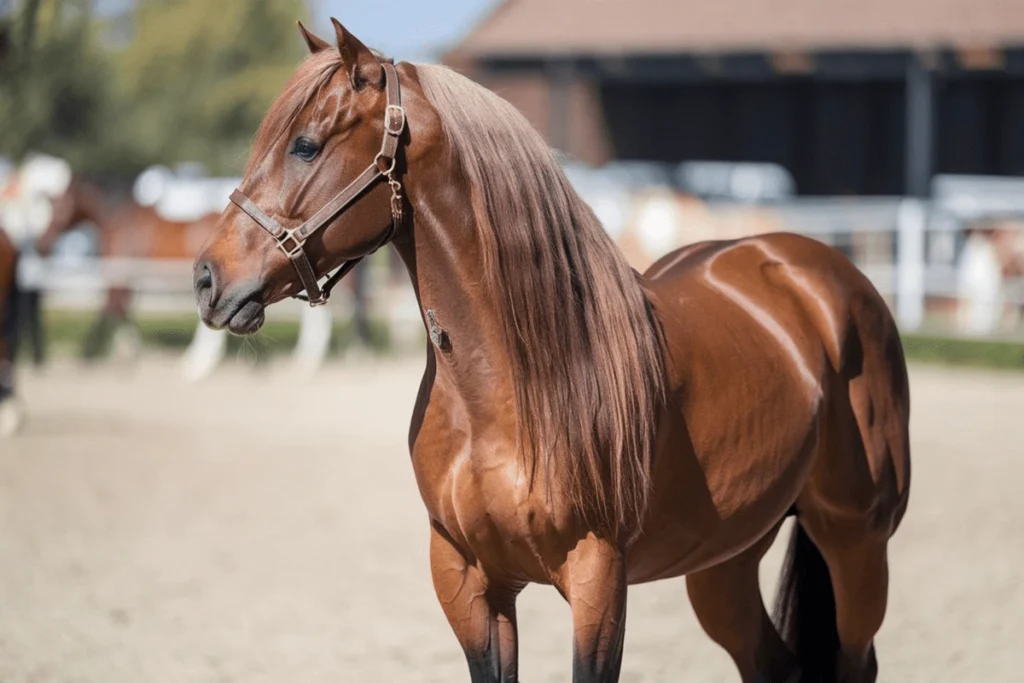
The Importance of a Healthy Diet for Horses
A horse’s diet directly influences its longevity and quality of life. Horses require a diet rich in fiber, which they obtain from forage like hay and grass. Fiber ensures proper digestion and reduces the risk of conditions like colic, which can be life-threatening. Providing clean, fresh water at all times is equally crucial to support hydration and metabolic functions.
Supplementing a horse’s diet with vitamins and minerals promotes healthy bones, muscles, and overall vitality. As horses age, their nutritional needs change. Senior horses may benefit from specially formulated feeds that are easier to chew and digest while meeting their evolving requirements. Avoid overfeeding grains, as this can lead to obesity and metabolic disorders, which compromise a horse’s lifespan.
Regular Exercise and Its Impact on Longevity
Exercise plays a pivotal role in extending a horse’s lifespan by supporting both physical and mental health. Regular activity helps maintain a healthy weight, improves cardiovascular function, and strengthens muscles and joints. Horses that graze in open pastures and engage in daily movement exhibit fewer signs of aging compared to those kept in confined spaces for extended periods.
However, balance is key. Overworking a horse, especially at a young age, can lead to joint and tendon issues that may shorten their lifespan. On the other hand, inadequate exercise can result in obesity, weakened joints, and reduced mobility in older age. Tailoring an exercise routine to a horse’s age, breed, and physical condition ensures they remain active and healthy without undue strain.
Common Horse Diseases and Their Effect on Lifespan
Certain diseases pose significant risks to a horse’s lifespan if not promptly addressed. Colic, a gastrointestinal condition, ranks as one of the leading causes of death in horses.It can go from feeling a little uncomfortable to causing very serious health problems.Preventing colic involves proper feeding practices, hydration, and access to regular turnout.
Another common issue, laminitis, affects the hooves and can severely limit a horse’s mobility. Factors like poor diet, obesity, or metabolic disorders often trigger this painful condition. Early detection and proper management are essential to prevent long-term damage.
Respiratory illnesses, dental problems, and parasitic infestations can also shorten a horse’s life if left untreated. Regular checkups with an equine veterinarian, combined with proactive care, significantly reduce the risk of these diseases. By recognizing early signs of illness and taking preventative measures, you can help your horse live a longer, healthier life.
Caring for Older Horses
Signs of Aging in Horses and When to Take Action
Horses, like humans, display clear signs of aging as they grow older. These signs often begin to appear in their late teens or early twenties, though the exact timing depends on their genetics, lifestyle, and care. Owners need to recognize these changes and act promptly to maintain their horse’s quality of life.
Some common signs of aging include:
- Physical Changes: Horses may lose muscle tone, develop a swayback, or experience greying around their muzzle and coat.
- Dental Issues: Worn or missing teeth make chewing difficult, which can lead to weight loss and improper digestion.
- Mobility Problems: Arthritis and stiffness in the joints can reduce a horse’s activity level and make movement uncomfortable.
- Behavioral Changes: Older horses may become more lethargic or show signs of anxiety in situations they previously handled well.
When these signs appear, consult an equine veterinarian for guidance. Getting help early can stop small problems from becoming big health issues. For instance, addressing dental problems promptly allows horses to maintain proper nutrition, while treating arthritis with joint supplements or medication improves their mobility and comfort.
Adjustments in Diet and Exercise for Aging Horses
As horses age, their nutritional needs and physical capabilities change, requiring owners to adjust their care routines.
- Diet Adjustments:
Senior horses benefit from feeds specifically designed for their age group. These feeds are often softer, easier to chew, and fortified with nutrients like calcium, phosphorus, and protein to support bone health and muscle maintenance. Including high-quality forage ensures proper fiber intake, while supplements such as omega-3 fatty acids promote joint health and reduce inflammation. Avoid feeding excessive grains, as older horses are more prone to metabolic disorders. - Exercise Adjustments:
Regular but gentle exercise remains essential for aging horses. Activities like light riding, walking, or turnout in spacious pastures keep their joints flexible, maintain muscle tone, and prevent weight gain. Avoid high-intensity work that could strain their aging bodies. Monitor their behavior closely during exercise, as signs of fatigue or discomfort indicate the need for adjustments to their routine.
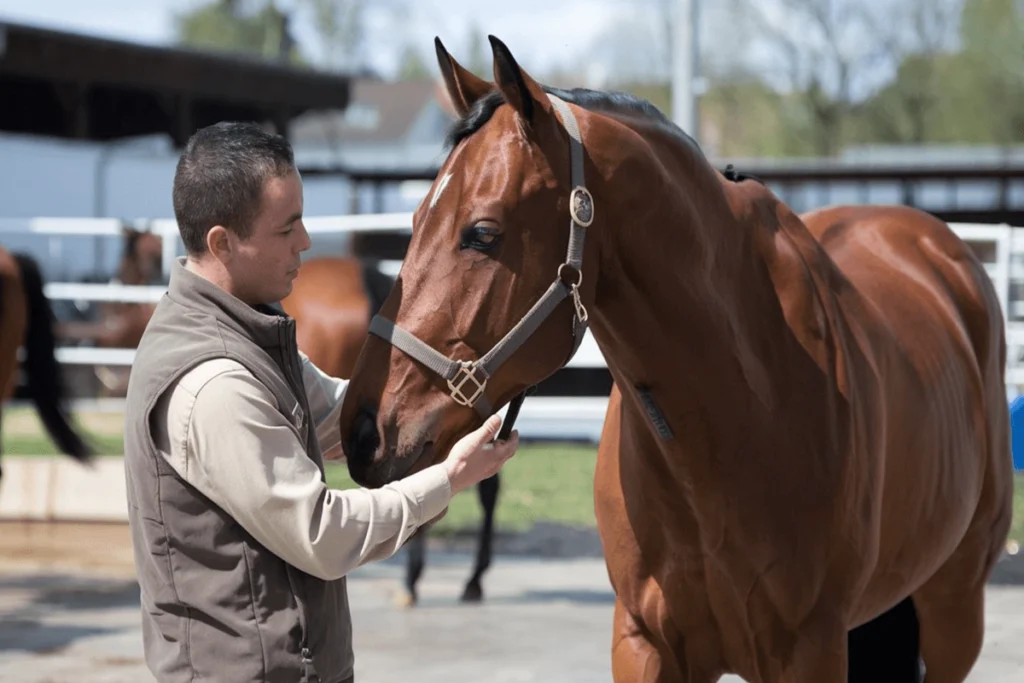
Tailoring diet and exercise plans for senior horses ensures they stay healthy and active without overexertion or nutritional deficiencies.
Importance of Regular Checkups with Equine Veterinarians
Routine veterinary care becomes even more critical as horses age. Older horses face an increased risk of health issues, many of which can progress rapidly without proper monitoring. Schedule checkups at least twice a year, or more frequently if your horse has chronic conditions or specific health concerns.
Veterinarians provide essential services for senior horses, such as:
- Comprehensive dental exams to identify and treat worn or damaged teeth.
- Nutritional evaluations to ensure their diet meets their changing needs.
- Vaccinations and deworming protocols tailored to their age and environment.
- Joint health assessments and recommendations for supplements or treatments.
These regular appointments allow veterinarians to detect and address potential problems early, significantly improving the horse’s quality of life and longevity.
Creating a Comfortable and Safe Environment for Senior Horses
Older horses thrive in environments that cater to their specific needs and limitations. Creating a safe, stress-free space promotes their physical and mental well-being.
- Shelter and Bedding: Provide a clean, dry, and easily accessible shelter with ample bedding. Soft surfaces reduce strain on their joints and offer comfort during rest.
- Accessible Pastures: Ensure pastures are free from hazards like holes, sharp objects, or slippery terrain. Gentle slopes and flat areas make movement easier for horses with arthritis or mobility issues.
- Companionship: Horses are social animals, and maintaining companionship with other horses or even smaller animals can reduce stress and improve their emotional health.
- Consistent Routine: Senior horses benefit from predictable feeding, turnout, and exercise schedules, as routine minimizes anxiety and supports their overall well-being.
Pay attention to environmental factors like temperature and weather. Older horses may need blankets in cold weather or shade and water in hot conditions to stay comfortable. By providing a safe and nurturing environment, you help your senior horse enjoy their golden years and live a long life with dignity and comfort.
Tips for Maintaining Horse Health and Wellness
Daily Horse Care Tips for Longevity
Caring for your horse daily is the foundation for a long and healthy life. Implementing consistent care routines helps ensure their physical and mental well-being while reducing the risk of preventable health issues.
- Grooming: Groom your horse daily to maintain coat health and check for cuts, swelling, or other abnormalities. Regular grooming improves circulation and gives you a chance to bond with your horse.
- Clean Water and Fresh Feed: Provide clean, fresh water at all times and ensure their feed is high-quality and free from mold or contaminants. Clean feeding areas regularly to prevent the spread of bacteria.
- Exercise and Turnout: Allow your horse plenty of time for movement, whether through riding, lunging, or turnout in a safe pasture. Regular activity keeps them fit and prevents boredom or behavioral issues.
- Hoof Care: Check their hooves daily for debris, cracks, or injuries. Schedule regular farrier visits every 6–8 weeks to prevent hoof problems that could lead to lameness.
Daily attention to these details ensures your horse stays in good health and helps you identify any potential issues early.
The Role of Nutritional Supplements for Horses
Nutritional supplements can play a significant role in maintaining a horse’s health and longevity, especially when their diet lacks specific nutrients. Supplements address individual needs and support various aspects of your horse’s well-being:
- Joint Health: Supplements containing glucosamine, chondroitin, and hyaluronic acid help reduce inflammation and improve joint mobility, particularly in aging or active horses.
- Digestive Support: Prebiotics and probiotics support gut health, reducing the risk of colic and promoting efficient nutrient absorption.
- Coat and Skin Health: Omega-3 and omega-6 fatty acids improve skin and coat condition, making them glossy and resilient.
- Bone and Muscle Strength: Calcium, phosphorus, and protein-rich supplements aid in maintaining strong bones and muscles, particularly in young or senior horses.
Always consult an equine nutritionist or veterinarian before adding supplements to your horse’s diet to ensure they meet your horse’s specific needs without causing imbalances.
Spotting Early Signs of Health Issues
Detecting health issues early can save your horse from serious complications and extend their lifespan. Observing your horse daily helps you notice subtle changes that may indicate underlying problems.
- Behavioral Changes: Pay attention to signs of lethargy, irritability, or withdrawal from usual activities. These could signal pain or discomfort.
- Appetite and Weight: Monitor their eating habits and weight. Sudden changes, such as refusing food or unexplained weight loss, may indicate dental issues, illness, or digestive problems.
- Coat Condition: A dull or patchy coat can reflect poor nutrition, parasitic infections, or hormonal imbalances.
- Mobility: Watch for limping, stiffness, or reluctance to move, which could indicate joint pain, injuries, or hoof problems.
Act promptly when you notice any unusual signs and consult a veterinarian for a thorough examination to prevent small issues from escalating.
Preventative Measures to Avoid Common Diseases
Prevention is key to keeping your horse healthy and avoiding diseases that could shorten their lifespan. Implementing proactive measures reduces risks and ensures their well-being:
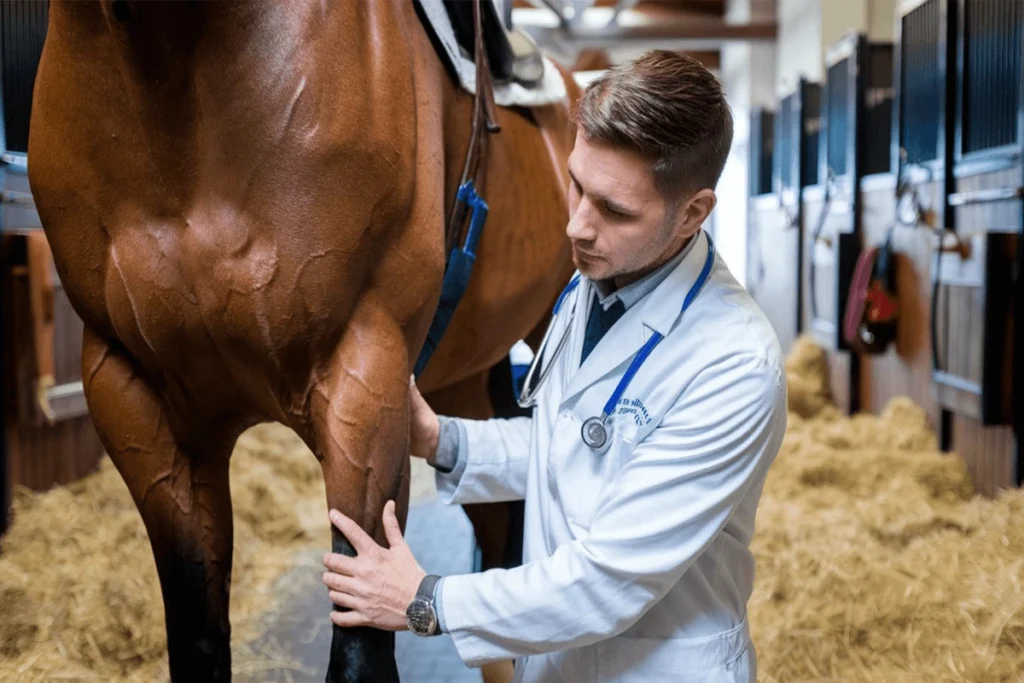
- Vaccinations: Keep your horse’s vaccinations up to date, including protection against tetanus, equine influenza, and West Nile virus.
- Deworming: Follow a regular deworming schedule tailored to your horse’s needs, as parasitic infections can cause significant health issues.
- Dental Care: Schedule regular dental checkups to address uneven wear, sharp edges, or missing teeth that could lead to feeding problems.
- Hygiene and Stable Management: Clean stalls, pastures, and feeding areas regularly to minimize exposure to bacteria, parasites, and fungi.
- Hoof Care: Prevent thrush and other hoof issues by maintaining clean, dry conditions and providing regular farrier services.
By staying vigilant and proactive, you can help your horse avoid many common diseases and ensure they lead a healthy, fulfilling life.
Debunking Myths About Horse Lifespan
Common Myths About Horse Longevity and Their Truths
Misinformation about horse lifespan often circulates among equestrians, leading to confusion about how long horses can live and how to care for them. Let’s debunk some common myths and explore the truths behind them:
- Myth: “All horses live the same number of years.”
- Truth: Horse lifespans vary based on breed, genetics, care, and environment. While the average is 25–30 years, factors like health management and lifestyle play a significant role in extending or shortening this range.
- Myth: “Older horses can’t perform or stay active.”
- Truth: With proper care, many senior horses remain active and healthy well into their 20s and 30s. Adjusted exercise routines and a balanced diet keep aging horses engaged and physically capable.
- Myth: “Horses only die of old age.”
- Truth: Horses often succumb to preventable issues like colic, laminitis, or untreated illnesses. Regular veterinary care and attentive management can prevent many premature deaths.
- Myth: “Ponies always outlive horses.”
- Truth: While ponies tend to have longer lifespans due to their sturdy build and lower metabolic demands, individual care and genetics determine longevity more than size or type.
Understanding these truths empowers horse owners to provide better care and dispel harmful misconceptions.
Can Certain Horse Breeds Live Longer?
Yes, certain horse breeds consistently exhibit longer lifespans due to their genetic makeup and resilience. If you’ve ever asked how long do horses live, it’s important to note that lifespan still depends heavily on care and management practices.
- Arabians: Known for their endurance and strong genetic foundation, Arabians often live well into their 30s or even 40s with proper care.
- Shetland Ponies: Ponies, particularly Shetlands, often outlive larger breeds. Their small size and robust health make them more resistant to common equine health issues.
- Draft Horses: Larger breeds like Clydesdales and Shires tend to have shorter lifespans, often 20–25 years, due to their size and higher susceptibility to joint and heart conditions.
- Thoroughbreds: These horses, bred for speed, usually have shorter lifespans averaging 25 years. The physical demands of racing often strain their bodies, but excellent care can extend their lives.
Recognizing the specific needs and genetic predispositions of your horse’s breed helps you provide care tailored to their potential longevity.
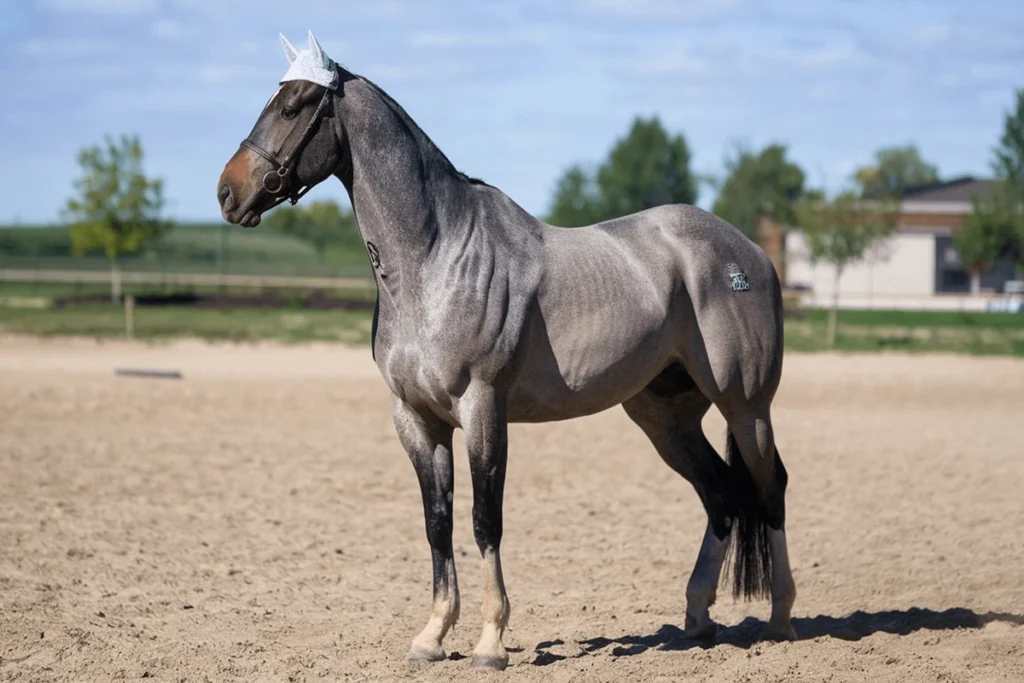
Misconceptions About Diet, Care, and Exercise
Misunderstandings about a horse’s dietary and care requirements can negatively impact their health and lifespan. Let’s clarify some of these misconceptions:
- Diet:
- Misconception: “All horses need the same diet.”
- Reality: Horses have unique dietary needs depending on their age, activity level, and health conditions. Senior horses require softer, more digestible feeds, while active horses need more energy-dense diets.
- Misconception: “Horses don’t need forage if they have enough grain.”
- Reality: Forage is the foundation of a horse’s diet, supporting digestion and preventing colic. Grain is a supplement, not a replacement.
- Misconception: “All horses need the same diet.”
- Care:
- Misconception: “Horses only need care when they’re sick.”
- Reality: Preventative care, including regular grooming, dental checkups, and hoof maintenance, ensures horses remain healthy and avoid common issues.
- Misconception: “Horses only need care when they’re sick.”
- Exercise:
- Misconception: “Older horses should not exercise.”
- Reality: Gentle, regular exercise is essential for maintaining muscle tone, joint mobility, and mental well-being in senior horses.
- Misconception: “Older horses should not exercise.”
Correcting these misconceptions ensures your horse receives the right balance of care for a longer, healthier life.
Practical Tips to Increase Your Horse’s Life Expectancy
You can extend your horse’s lifespan by adopting proactive care practices that address their physical, mental, and emotional needs. If you’re wondering how long do horses live, proper care can significantly impact their longevity. Here are some actionable tips:
- Prioritize Nutrition:
Feed a balanced diet tailored to your horse’s age, breed, and activity level. Provide high-quality forage, clean water, and supplements when necessary to meet their nutritional requirements. - Maintain Routine Health Checks:
Schedule regular veterinary visits to monitor their overall health. Preventative care, such as vaccinations, deworming, and dental exams, helps catch potential problems early. - Encourage Daily Movement:
Allow your horse plenty of turnout time and incorporate exercise appropriate for their age and condition. Movement promotes circulation, joint health, and mental stimulation. - Provide a Safe Environment:
Ensure your horse’s living area is clean, comfortable, and free of hazards. Sturdy shelters and secure fencing reduce the risk of injuries. - Monitor Behavior and Body Condition:
Stay attuned to changes in appetite, weight, coat quality, or behavior. Early detection of issues allows for timely intervention.
By focusing on these strategies, you can enhance your horse’s quality of life and help them reach their full lifespan potential.
Conclusion
Horses hold a special place in our lives, and ensuring their health and happiness is a rewarding responsibility. By understanding how long horses live, recognizing the factors that influence it, and adopting proper care practices, you can help your horse thrive for years to come. Focus on providing a balanced diet, regular exercise, routine veterinary checkups, and a safe, nurturing environment.
Every horse is unique, and your dedication to their well-being makes a significant difference in their quality of life. Whether you’re caring for a young foal or a senior horse, your efforts create a bond of trust and love that lasts a lifetime. With thoughtful care and attention, you can support your horse’s longevity and make the journey together truly fulfilling.
Learn More about Pets and Different breeds From HERE!
Find out the Latest stuff for your Pet On Pet MD Official
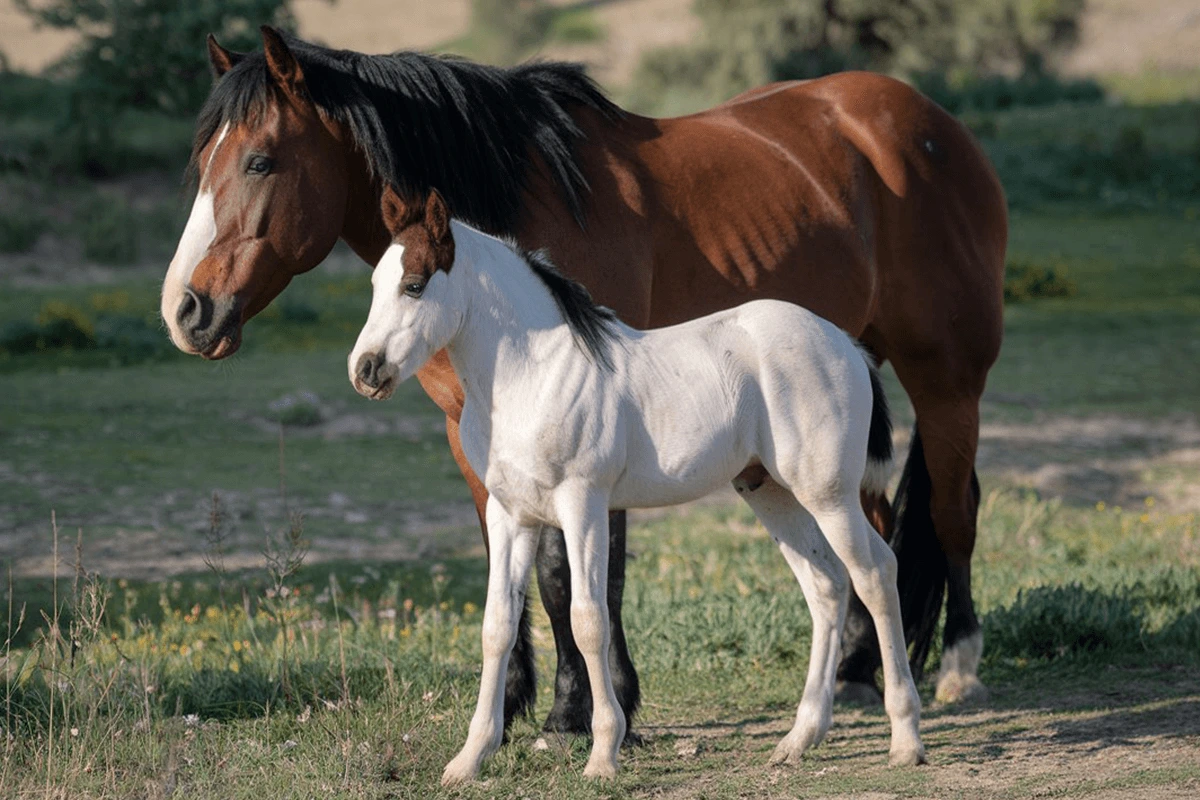
2 thoughts on “How Long Do Horses Live? The Ultimate Guide to Horse Care”
Comments are closed.